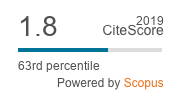Evidence of mispricing for South African listed R&D firms contributed by accounting conservatism
Abstract
Purpose: The purpose of this research is to investigate the impact of capitalization of research and development on the valuation of equities for listed firms in South Africa.
Design/methodology/approach: 15 years of financial data (2000 to 2014) was collected, and portfolios with similar price-to-book and market size ratios were formed to find any evidence of any post-investment excess returns and the association to the level of research and development investment. Portfolios were re-formed and annually ranked by their research and development intensity relative to sales. In addition, we looked at the changes in excess returns after adjusting the book value as a result of capitalizing R&D expenditure, to see if the distortion imposed by expensing R&D contributed to the under-valuation of firms that invest in R&D.
Findings: The results indicate that firms that invest in research and development are systematically under-valued. We found no evidence of any positive association between the returns and investment levels, but rather found evidence of the glamour stock phenomenon in highly intensive research and development firms.
Research limitations/implications: The sample data is limited to listed firms in South Africa, and for firms with intermittently omitted R&D on their financial report, we have assumed that such expenditure is zero for the non-disclosed period for the purpose of capitalization and amortisation. Listed firms whose main focus is on building intangible assets, are relatively few, hence our research is descriptive in nature.
Practical implications: This paper highlights the commercial significance of valuing the long-term benefits of research and development. Capitalizing the development phase as afforded by the IASB lacks standardization, and as such, inconsistencies arise in the earnings reflected on companies’ financial statements. For investors though, highly intensive R&D firms should be avoided as these earn negative returns.
Originality/value: The authors are not aware of any studies showing the effect of accounting rules on research and development that have been conducted in South Africa, or any research that have shown the glamour stock phenomena when investigating the impact of capitalization of research and development. Thus our contribution was to provide evidence on the valuation of stocks for listed firms that report research and development in South Africa that may be a result of the accounting rules. There is limited research on the on the accounting treatment of research and development in emerging markets, whose stock exchanges have been shown to not be highly correlated with the more developed markets, hence enables investors to diversify risk. This should motivate both managers and investors to venture beyond what the conservative accounting treatment of R&D has possibly instigated when valuing stocks.
Keywords
DOI: https://doi.org/10.3926/ic.880
This work is licensed under a Creative Commons Attribution 4.0 International License
Intangible Capital, 2004-2024
Online ISSN: 1697-9818; Print ISSN: 2014-3214; DL: B-33375-2004
Publisher: OmniaScience








